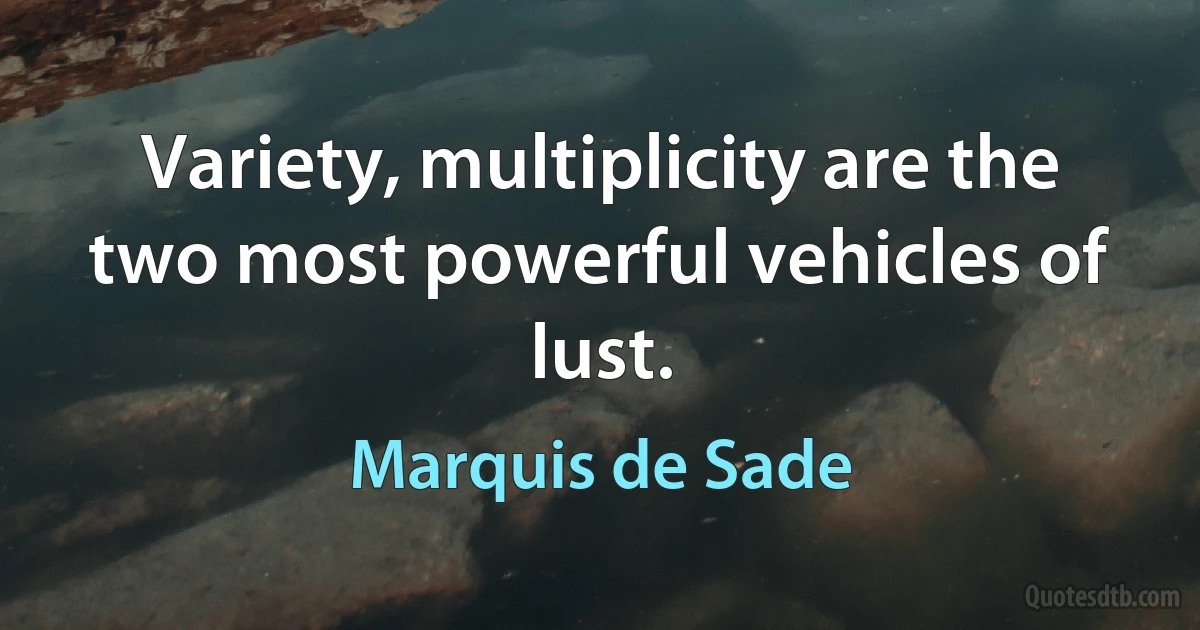Multiplicity Quotes - page 2
I remained there [in The Netherlands, 1914-18] for the duration of the war, continuing my work of abstraction in a series of church. facades, trees, houses, etc. But I felt that I still worked as an Impressionist and was continuing to express particular feelings, not pure reality. Although I was thoroughly conscious that we can never be absolutely 'objective', I felt that one can become less and less subjective, until the subjective no longer predominates in one's work. More and more I excluded from my painting all curved lines, until finally my compositions consisted only of vertical and horizontal lines which formed crosses, each separate and detached from the other. Observing sea, sky and stars, I sought to indicate their plastic function through a multiplicity crossing verticals and horizontals.

Piet Mondrian
The new vision.... does not proceed from a fixed point. Its viewpoint is everywhere, and not limited to any one position [in space]. Nor is it bound by space or time (in accordance with the theory of relativity) [of Einstein ]. In practice, the viewpoint is in front of the plane... Thus this new vision sees architecture as a multiplicity of planes; again flat. This multiplicity composes itself (in an abstract sense) into a flat image [in contrast to Theo van Doesburg who emphasized the dynamic position of the viewer – a central idea of Futurism in 1919].

Piet Mondrian
Merce [Cunningham] is my favorit artist in any field. Sometimes I'm pleased by the complexity of a work I paint. By the fourth day I realize it's simple. Nothing Merce [Cunningham] does [choreography for dance] is simple. Everything has a fascinating richness and multiplicity of direction. [Jasper Johns did a lot of décors for :Merce Cunningham, as Robert Rauschenberg did and Frank Stella, ].

Jasper Johns
For me, Still's pictorial dramas are an extension of the Greek Persephone myth. As he himself has expressed it, his paintings are 'of the Earth, the Damned, and of the Recreated'. Every shape becomes an organic entity, inviting the multiplicity of associations inherent in all living things. To me they form a theogony of the most elementary consciousness, hardly aware of itself beyond the will to live – a profound and moving experience. [in the catalogue introduction for the first one-man-show of Clyfford Still].

Mark Rothko
The model that can be drawn up, of a plural society in which the multiplicity of forces and institutions prevent any one of their number dominating the rest, and which function on the basis of a broad and non-doctrinaire consensus - this picture does not warm the blood like wine. To appreciate and savour its appeal, one needs a rather sophisticated taste, perhaps.

Ernest Gellner
Thus the universe is to be conceived as attaining the active self-expression of its own variety of opposites of its own freedom and its own necessity, of its own multiplicity and its own unity, of its own imperfection and its own perfection. All the opposites are elements in the nature of things, and are incorrigibly there. The concept of God is the way in which we understand this incredible fact that what cannot be, yet is.

Alfred North Whitehead
From one viewpoint there were (potentially) a multiplicity of Gleisters; but from another viewpoint there was only one, and he was that one. After all, it didn't matter what these other people called themselves or where they came from; he was only the person he was here and now, the person whom he experienced. Reality is positional, ego is relational, and nature doesn't deal in abstractions.

Robert Sheckley
Schools have no use except for discerning the analytic procedures of art. No school is capable of pressing on to a synthesis in isolation. Painting can not, without falling into abstraction, let a partial aspect of art dominate, whether it be drawing, color, composition, or any other one of the extraordinary multiplicity of means the totality of which alone constitutes this art.

Gustave Courbet
One sees that all explicit opposites are implicit allies-correlative in the sense that they "gowith" each other and cannot exist apart. This, rather than any miasmic absorption of differences into acontinuum of ultimate goo, is the metaphysical unity underlying the world. For this unity is not mere one-ness as opposed to multiplicity, since these two terms are themselves polar. The unity, or inseparability, of one and many is therefore referred to in Vedanta philosophy as "nonduality" (advaita) to distinguish it from simple uniformity.

Alan Watts
I think Spinoza was a complete monist. Unity is good, multiplicity cannot lead you to the truth. His political theory is in some ways like that of Hobbes. From his point of view, in politics you have to govern. In order to govern, a rational person might have to do things which are not strictly honourable. Spinoza is a surprisingly tough-minded political thinker.

Baruch Spinoza
There is another responsibility of the states. It is quite aside from this one of jurisdiction. It is the subject of law enforcement. We are not a lawless people, but we are too frequently a careless one. The multiplicity of laws, the varied possibilities of appeals, the disposition to technicality in procedure, the delays and consequent expense of litigation which inevitably inure to the advantage of wealth and specialized ability - all these have many times been recounted as reproaches to us. It is strange that such laxities should persist in a time like the present, which is marked by a determined upward movement in behalf of the social welfare. But they do exist. They demonstrate a need for better, prompter, less irksome, and expensive administration of the laws. They point the necessity for simplification and codification of laws; for uniformity of procedure; for more accurate delimitation of State and Federal authority.

Calvin Coolidge
But there is another ... recent development ... the greatly disproportionate influence of organized minorities. Artificial propaganda, paid agitators, selfish interests, all impinge upon members of legislative bodies to force them to represent special elements rather than the great body of their constituency. When they are successful, minority rule is established. ... The result is an extravagance on the part of the Government which is ruinous to the people and a multiplicity of regulations and restrictions for the conduct of all kinds of necessary business, which becomes little less than oppressive. ...

Calvin Coolidge
The heart, oddly enough, seems to be the essential organ concerned. When we are in a hurry or doing something we dislike, we clench the heart, exactly like clenching a fist, and nothing can get in. When we are filled with a sense of multiplicity and excitement we somehow 'open' the heart and allow reality to flow in. But in that state we only need to entertain the shadow of some unpleasant thought for it to close again. And human beings are so naturally prone to mistrust that it is hard to maintain the openness for very long. Children on the other hand find it easy to slip into states of wonder and delight when the heart finally opens so wide that the whole world seems magical. the 'trick' of the peak experience lies in this ability to relax out of our usual defensive posture and to 'open the heart'.

Colin Wilson
In every nature, and in every portion of nature, which we can descry, we find attention bestowed upon even the minutest parts. The hinges in the wings of an earwig, and the joints of its antennae, are as highly wrought, as if the Creator had nothing else to finish. We see no signs of dimunition of care by multiplicity of objects, or of distraction of thought by variety. We have no reason to fear, therefore, our being forgotten, or overlooked, or neglected.

William Paley
The problem is not to discover in oneself the truth of one's sex, but, rather, to use one's sexuality henceforth to arrive at a multiplicity of relationships. And, no doubt, homosexuality is not a form of desire but something desirable. Therefore, we have to work at becoming homosexuals.

Michel Foucault
What a circus act we women perform every day of our lives. Look at us. We run a tightrope daily, balancing a pile of books on the head. Baby-carriage, parasol, kitchen chair, still under control. Steady now! This is not the life of simplicity but the life of multiplicity that the wise men warn us of.

Anne Morrow Lindbergh
Ikenobo Sen'o, a master of flower arranging, once said (the remark is to be found in his Sayings): "With a spray of flowers, a bit of water, one evokes the vastness of rivers and mountains." The Japanese garden too, of course symbolizes the vastness of nature. The Western garden tends to be symmetrical, the Japanese garden asymmetrical, and this is because the asymmetrical has the greater power to symbolize multiplicity and vastness. The asymmetry, of course, rests upon a balance imposed by delicate sensibilities. Nothing is more complicated, varied, attentive to detail, than the Japanese art of landscape gardening. Thus there is the form called the dry landscape, composed entirely of rocks, in which the arrangement of stones gives expression to mountains and rivers that are not present, and even suggests the waves of the great ocean breaking in upon cliffs.

Yasunari Kawabata



